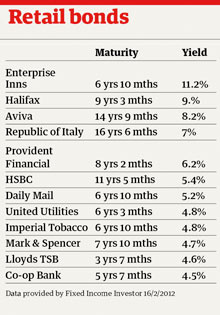Money Saving Expert
Is
perhaps the the best source out there.
Do
Not Use Paypal To Pay A Credit Card Bill
Do it that & lose Section75
protection if the supplier does not come through.
Ten Ways To Improve The Return On Your
Savings
QUOTE
Fed up with low interest
rates on your savings? Want to put your cash to work? Patrick Collinson
looks at the returns and the risks of bonds, funds, shares, Isas and
more
Fed up with low interest rates on your
savings? Then go down the pub and earn 11% interest by handing
your money to one of the biggest companies operating pubs in the UK.
It's just one of the more exotic ways that savers, desperate to earn
more on their cash, can now pick up a better return.
Britain's biggest financial advice group, Hargreaves Lansdown, has opened a new service that lets small savers buy high-interest corporate bonds that pay rates far above those available from accounts at the high street banks. The retail bonds of pub company Enterprise Inns, for example, are paying interest of 11.2% and assuming it doesn't go bust, you'll be paid the interest, and your capital back at maturity. Bonds in Halifax, now owned by Lloyds Bank, are paying 9%, while insurance company Aviva is paying 8.3%. Even Goldman Sachs is paying a "coupon" of 6.5%.
With the third anniversary of the 0.5% base rate coming up in March, and predictions that interest rates won't rise for another two or even three years, it is hardly surprising that squeezed savers are seeking out new homes for their cash. But what are the risks involved when savers leave the comfort of a standard deposit account?
Here we highlight the many different ways that savers can receive more on their savings as well as the risks involved. How about premium bonds, and the £1m monthly prize they offer? Or the dividends worth as much as 8% a year on shares bought direct from a stockbroker? Or an equity income fund, where the fund manager buys lots of shares to diversify the risk, and which pay an income of around 4%-4.5% a year.
Or perhaps you could join one of the growing "peer-to-peer" websites where you cut out the bank and lend your money directly to individuals and businesses. Interest rates paid to investors average 6% to 8%, and have gone as high as 11%.
But all these options involve taking risk. Corporate bonds, such as those of Enterprise Inns or Aviva, are only as good as the company that stands behind them. If Enterprise Inns goes bust, savers could see their capital wiped out.
So what if you'd prefer to play safe and leave your money in a fully-protected deposit account? What can you do to squeeze out the best return? We highlight the best-paying cash Isas as the first step for savers seeking a high tax-free return. And if you're happy to lock your money away for longer, we name the best fixed-rate accounts.
Here are 10 ways you might consider to make your money go further. Click through or scroll down for the returns, advantages and disadvantages of each option:
1. Single corporate bonds
2. Cash Isas
3. Fixed-rate bonds
4. Inflation-linked bonds
5. Corporate bond fund
6. Gilts
7. Premium bonds
8. Dividends from shares
9. Equity income funds
10. Peer-to-peer lending
1. Single corporate bonds
Income 1.5% to 11%
The deal If you buy a corporate bond, you are buying a promise from a company that it will pay you a fixed level of interest each year, plus return all your capital at the end of the term.

The big risk is whether the company will go bust and default on its payments. You can buy a bond when it is first issued by the company, or in the market, where they are traded like shares. Currently, one of the highest yielders among big British companies with "retail" bonds is Enterprise Inns, which is yielding 11% on a bond maturing in six years and 10 months. But the debt-laden pub group has seen its shares halve over the past year, and the business is under intense pressure, so that 11% may not be secure.
Further down the risk scale, an Aviva bond pays 8.23% a year, but it's another 14 years and nine months before it matures. A good bet might be Lloyds Bank, which has a bond maturing in three years and one month, which is paying 5.5% a year.
Less of a bet might be the Italian government you can buy its (sterling-denominated) bonds and earn 7% interest. But the tie-in is 16 years. You're betting on Mario Monti making sure the Italians pay up.
Security None. If the company goes bust, you could lose all your money.
Advantages Much better rates than deposit accounts. If the bond has more than five years to maturity, you can put it in a tax-free Isa. Minimum investments are usually no more than £100. You can access your cash during the term by selling the bond, although you will only get the market value which could be more or less than the total you originally put in. Ideally, you will want to keep it until it matures.
Drawbacks The risk of defaults and "haircuts". You may lose some of your capital if you sell before the maturity date (although you could make some, too). Bonds trade on the money markets, and their prices rise and fall according to demand. If the markets believe interest rates are going to rise, the capital value of the bond is likely to fall.
How to invest Easier than you think. Retail broker Hargreaves Lansdown has a service for small investors who want to buy (it has 700 on offer) go to hl.co.uk to open an account, although dealing is by telephone only. Costs are 1% of the trade, minimum £20, maximum £50. Additional costs for putting it into an Isa. Lots of other similar deals the London Stock Exchange has a "locate a broker" page on its website. Major retail brokers include Barclays Stockbrokers, Alliance Trust Savings, Halifax Sharedealing, Selftrade, the Share Centre and TD Waterhouse.
2. Cash Isas
Income Look for rates of 3% (easy access) or 4% (fixed)
The deal The rules allow everybody over 16 to put up to £5,340 (for the tax year 2011-2012) in to a deposit account where the interest earned is tax free, called an Individual Savings Account. You can also put another £5,340 into a tax-free stocks and shares Isa, but you must be over 18. Most banks and building societies offer a cash Isa, but shop around for the best deal. Also be prepared to move your old Isa money across to the latest best-payer.
 Nationwide offers the best
rate on a standard cash Isa. Photograph: Retuers
Nationwide offers the best
rate on a standard cash Isa. Photograph: Retuers
There are two types of cash Isa those that pay a variable rate and those that are fixed. The fixed ones pay a higher interest rate, but if you take your money out before the fixed term, you may suffer penalties.
Currently the best rate on a standard cash Isa is from Nationwide building society, at 3.1%, although it's an online only deal, and the minimum deposit is £1,000. After that Cheshire BS pays 3.06%, Newcastle BS and the AA pay 3.05%, while ING and M&S are on 3%. Always look out for a fall in headline rates Nationwide promises 3.1% only until 31 January 2013.
If you're happy to lock your money away, the best deals fixed over one year are Aldermore at 3.35%, with Metro Bank and Leeds BS at 3.25%. The Halifax and the Post Office are paying 3.7% respectively on their two- and three-year fixed rate Isas. NatWest is offering the highest fixed interest rates if you transfer from other providers. The bank will pay preferential rates to those switching Isa providers 3.35% if they lock in for one year, 3.9% for two years and 4.2% for three years. Minimum transfer is £1,000 and applications must be received by 29 February.
Security The Financial Services Compensation Scheme provides cover for deposits up to £85,000. This is per person, per authorised firm. So if you have more than £85,000, spread the money around different providers.
Advantages Income is tax free. Minimum deposit is often £1, rarely above £1,000. You can transfer past Isas with relative ease.
Drawbacks Best deals often include one-year only bonus. Interest rates on many cash Isas drop in later years. Rates can be worse than non-Isa accounts. You can only put £5,340 into a cash Isa each year.
How to invest Look at the Guardian Money best buy tables or on moneyfacts.co.uk for more information.
3. Fixed-rate bonds
Income 3.5% to 4.6%
The deal These are the savings accounts from banks and building societies that pay the highest rates of interest, but only if you lock your money away for two to five years.
The capital is guaranteed (and backed by the FSCS) and the rates can be attractive. The risk is that you need the money before the bond matures. Cashing in a bond early usually results in stiff penalties.
The longer you are willing to lock the money away, the better rate you receive. Currently, the best short-term fixed rate bonds, where you can't access the money for a year, come from First Save (3.6%), Aldermore (3.55%) and Investec (3.55%). If you prefer a better-known name, Bank of Scotland has a one-year bond at 3.3% on a minimum deposit of £2,000.
Once you move to a three-year lock-in, the rates improve markedly. Clydesdale Bank and Yorkshire Bank (both part of the same group) have a three-year fixed-rate bond paying 4.1%, available in branch and online, while both Saga and Halifax have online-only deals paying 4% for three years.
The highest interest rate, 4.65%, is paid on the five-year bond from BM Savings. If you're unfamiliar with the name, the BM stands for Birmingham Midshires and ultimately it's part of the Lloyds Bank group. It is available online or by phone on 0845 602 2828. But watch out for the early withdrawal charge, which can range from 90 to 365 days' interest on the amount withdrawn. "It may result in you getting back less than originally deposited," BM says.
Other long-term fixed-rate deals include the AA (4.6%), Saga (4.5%) and State Bank of India (4.5%).
If you have already used up your cash Isa allowance, and you don't want to lock the rest of your money away in a fixed-rate bond, another alternative is the Investec High 5 and High 10 accounts. These promise to pay the average interest rate of the top five and top ten best-buy accounts as published by Moneyfacts, so your account should always pay a good rate. Currently, it would give you a rate of either 3.17% or 3.11%. The catch? You need to deposit a minimum of £25,000. Nationwide has a Champion Saver account that aggregates the five highest branch-based interest rates from a group of eight high street banks, but currently that only results in an interest rate of 2.01%.
Security FSCS covers depositers up to £85,000 per person per firm. Note that Yorkshire and Clydesdale Bank are covered by the same banking licence, so any balances held by customers at both banks are combined for the purposes of FSCS compensation. In other words, don't have more than a combined £85,000, per person, at Yorkshire and Clydesdale banks.
Advantages Much better rates than instant access. Minimum deposit often £1, rarely above £1,000.
Drawbacks Early withdrawal charges. If interest rates bounce back from their historic lows, you may find your cash is locked into an account paying a relatively low rate of interest.
How to invest The best rates tend to be offered by specialist providers, usually without a high street presence. You'll have to do it all online or by post. Many deals are only available for a short offer period. Keep an eye out for new deals in the Guardian Money and moneyfacts.co.uk best buy tables.
4. Inflation-linked bonds
Income The retail prices index (RPI) plus a small bonus.
 If inflation soars, you're
in the money. Photograph: Simon Crisp
If inflation soars, you're
in the money. Photograph: Simon Crisp
The deal National Savings & Investments has withdrawn its bond, leaving only the Post Office offering a deal for now. Its inflation-linked bond Issue 4 is open until 29 March at the latest, and might be withdrawn before then. It pays RPI plus 0.25% a year if you hold it for three years, and RPI plus 0.5% a year if held for five years. If RPI stays at the current level, 3.9%, that suggests a return of 4.15%-4.4%. But that's a very big if. Most economists expect RPI to fall further during 2012.
Security FSCS covers depositers up to £85,000. The Post Office product is sold by Bank of Ireland UK.
Advantages Your money will be protected from inflation. Your initial capital is guaranteed. If inflation soars (and some say quantitative easing must lead to price inflation) then you're in the money. Minimum deposit is just £500.
Drawbacks Inflation is heading down, economists say the CBI's central forecast is 3.5% in 2012, falling to 3% in 2013. Other say it could plummet to 2% by early 2013. At that level, the bond will be paying less than many instant-access cash Isa accounts. Money in the Post Office account does not roll up; so if you deposit £10,000 and inflation is 5% in year one, then 4% in year two, your deposit rises to £10,500 then £10,900, not £10,500 then £10,920. A "breakage" charge if you need the money early, means you may not get back as much as you deposited. Like other non-Isa products, returns are taxable at your marginal rate.
How to invest Online at postoffice.co.uk or call 0800 169 7500. If you'd rather wait for National Savings to re-open its deal, you can pre-register at nsandi.com
5. Corporate bond fund
Income From3.5% to 6.5%
The deal The fund manager spreads the risk of buying a single corporate bond by investing in a spread of different bonds. Table-topping Old Mutual Corporate Bond fund currently yields 4.6% and has given investors a total return (yield-plus-capital gain) of 70% over the past three years. Others have managed just 10-20% over three years. One rule of thumb is that the higher the yield on offer, the higher the level of risk.
Security The FSCS covers investors up to £50,000 for mismanagement but not for underperformance.
Advantages The idea (not that it always works in practice) is that you earn a decent return, plus pick up a little bit of capital appreciation. The funds are less risky than single corporate bonds. They tend to have 50-60 different bonds in the portfolio, so a single default doesn't wipe you out. You can put up to £10,680 in a tax-free investment Isa .
Drawbacks Fees, fees and fees. Your yield is reduced by around 2% every year by the cost of employing the manager and the commission to the adviser or dealer. And diversification doesn't mean they don't get it wrong; some bond managers were hugely into the bonds of banks going into the financial crisis, and lost a lot of money.
How to invest Do-it-yourself on fund platforms such as Fidelity Funds Network or Hargreaves Lansdown Vantage, or through discount brokers such as Chelsea Financial Services. Minimum investments typically £1,000 or £50 per month.
Expect to pay a small initial charge plus 1.5%-2% a year. Trustnet.co.uk is a good source of fund performance information.
Or use an adviser to select a fund for you, but the initial charge may be much higher. Go to unbiased.co.uk to find an independent adviser.
6. Gilts
Income Around 0.4% to 3.3%
The deal Gilts are the name given to the bonds issued by the UK government to finance our national debt. They pay a fixed rate of interest twice a year (the "coupon") and return the capital on the maturity date of the bond. Ones that are maturing in two years are currently paying only 0.4% interest, ones maturing in 10 years are paying 2.2%. Hold for 30 years and you crawl up to 3.3% interest.
 Riots in Greece: gilts are
only as secure as the government is. Photograph: AP
Riots in Greece: gilts are
only as secure as the government is. Photograph: AP
Security Not covered by the FSCS. It depends on how safe you think the government is; the Greeks will only pay 30-50% of the money back on maturity after the "haircut".
This week Moody's put the UK government on "negative outlook" ahead of a possible downgrade, but we're still a long way off Greece's "junk" rating.
Advantages The Treasury has never defaulted on its bonds. Anyway, it can print money to pay you back, if necessary. If we're in for a decade of Japan-style deflation, they will be good value (but not many people think that). You can put them in an Isa, so long as they are five years from maturity.
Drawbacks The financial crisis has sent yields to near-historic lows great if you've been holding gilts, not so great if you're buying them now. Quantitative easing (buying of gilts) should keep yields down.
If you sell before maturity, you may not get back all your capital. Gilts are bought and sold on the stock market where their price can go up or down.
Most fund managers think that gilts are currently overpriced.
How to invest Gilts can be bought in units of £100. You can no longer buy them from the Post Office or National Savings, but you can buy through a stockbroker, or through the government's Debt Management Office Retail Purchase and Sale Service.
7. Premium bonds
Income Around 1% to 1.5%. Or £1m if you win the big one.
The deal Only available from National Savings & Investments and, right now, it's not particularly attractive. NS&I says average payout is equal to 1.5%. In reality, it's closer to 1%, argues moneysavingexpert.com's Martin Lewis.
 Bruce Forsyth with Ernie
in 1962. Photograph: ITV / Rex Features
Bruce Forsyth with Ernie
in 1962. Photograph: ITV / Rex Features
Security The £85,000 FSCS net applies. An individual can put in £30,000 maximum, so all savings are guaranteed.
Advantages The income is tax-free. You can buy bonds with a minimum £100. Every month one bond holder picks up the £1m prize but there are 23m bonds, so don't hold your breath.
Drawbacks The odds of winning are just 24,000 to one. The majority of people will win much less than the published 1.5% interest rate, says Martin Lewis, who has a premium bond prize probability calculator on his site. It suggests that someone buying £1,000-worth will win nothing over the first year and only £50 over five years.
How to invest Apply online at nsandi.com or call 0500 500 000. You can also buy at the Post Office.
8. Dividends from shares
Income 3% to 8%
The deal Companies make profits and share them out as dividends-per-share. Most stocks in the FTSE 100 pay out dividends worth 3-4%. But shares go up and down in value, and companies can axe their dividends.
In the FTSE 100, the highest paying company is currently RSA, yielding 8%, with insurers Aviva (7.2%) and Standard Life (5.7%) also close to the top. At the other end of the table, Next yields 2.9%, while BP is on 4.2%. But these are a snapshots there is no guarantee that if you buy RSA today, you will receive a dividend worth 8%. The figure is worked out on the current share price compared with the last dividend. There are no guarantees about the next dividend.
Security None. Shares are not covered by the FSCS.
Advantages Choose the right company, and you could earn a decent dividend plus a rise in the share price.
Drawbacks A high yield figure may appear attractive, but it may also be a sign that the market thinks the company won't pay the dividend. The company you invest in may go bust and you will lose all your money. Far-fetched? Remember Northern Rock.
How to invest Do it yourself cheaply through an online share dealer (see corporate bonds). If you have £50,000 or more to invest, a private client stockbroker will put together a portfolio. More information at www.apcims.co.uk
9. Equity income funds
Income 3.5% to 6%
The deal Fund managers put together a portfolio of 50-100 dividend-paying shares and attempts to hit a target return, usually in the 3.5% to 4.5% region. The idea is that they also pick companies whose share price will grow, so you enjoy a double whammy of capital growth and rising income. But it doesn't always work out that way.
 Neil Woodford's Invesco
fund is riding high. Photograph: Jim Winslet
Neil Woodford's Invesco
fund is riding high. Photograph: Jim Winslet
Currently the top-performing UK equity income fund, Unicorn UK Income, is up 129% over three years and is yielding 4.5%. Henderson, JO Hambro, Standard Life and Aberdeen all have strongly performing UK equity income funds. But the variation is huge at the other end of the table, Newton Higher Income has risen by only 29.5%, although it yields 6.8%.
The biggest income fund in Britain is Invesco Perpetual Income and its near-mirror High Income fund, run by Neil Woodford, with £20bn under management. They are yielding around 3.8%, and after slipping down the performance tables are now riding high again, respectively ranked second and third out of 104 funds in the sector.
Don't limit yourself to UK shares. There are a growing number of funds that aim for a 3-4% income from shares overseas, even in Asia, traditionally a growth rather than income market. For example, Fidelity recently launched a Global Dividend fund which is targeting an income yield of around 4% a year. Or buy a fund-of-funds which diversifies even more by investing in lots of different portfolios (although watch out for fees). For example, HSBC's World Selection Income Portfolio brings together a range of more than 20 corporate bond and equity income funds under one umbrella.
Many financial advisers recommend equity income funds even if you do not actually need to take the income each year, and choose instead to accumulate it within the fund. The total return on an equity income fund often outstrips the total return on growth funds.
What they don't tend to recommend are investment trusts, which don't pay them commission. Yet there are plenty of trusts with an income-orientation, such as Acorn Income, which has given a capital return of 210% in the past three years and currently yields 3.7%.
Security The FSCS can pay compensation up to a maximum of £50,000 to consumers who lose money because of bad or misleading advice, negligent management of investments, misrepresentation or fraud, and the firm concerned has gone out of business and can't return your investments or money owed. It will not pay compensation for losses arising solely from investment performance.
Advantages If stockmarkets rise, you will enjoy capital growth. On some valuation measures, the London stock market is looking cheap compared to history.
Drawbacks Fees. You lose 1.5% to 2% a year to the manager, adviser, custodian, etc. Shares are inherently risky pick the wrong time to invest and the wrong fund, and you'll soon be out of pocket. Actively-managed funds rarely outperform index funds over the longer term.
How to invest You can buy direct from the providers, but they still (annoyingly) levy the same fees as if you go through an adviser. Many advisers will discount the initial charge (cutting it from 5% to below 1%) and may rebate some of the annual commission. Popular do-it-yourself fund supermarkets include h-l.co.uk, Fidelity's FundsNetwork (where you can choose from 1,200 funds) and Alliance Trust Savings. Buying an investment trust is like buying a share go through a share dealer (see Dividends from shares). For information on performance of income funds, use trustnet.co.uk.
10. Peer-to-peer lending - see P2P Lending
Income 5% to
10%
The deal
Websites that cut out banks by putting
people with money to lend in touch with those wanting to borrow. The
biggest is ZOPA, which has channelled £160m. It says the average
achieved by lenders is 6.2% after fees but before bad debt. The
default rate is projected at 0.5%, cutting the typical return to 5.7%.
You can lend from £10 upwards, and choose the level of risk you're
happy with. Zopa risk-bands the borrowers from A to C. You also choose
whether you want to lend over 36 or 60 months. A loan to a borrower
rated A* over 36 months will give a return of 5.5% gross before bad
debts, while a loan to a C borrower is at 10.1% gross. If you lend
£500 or more, your money is spread across at least 50 borrowers.
Funding Circle applies the same idea as Zopa, but lends your money to businesses rather than individuals, with £24m committed since its launch in 2010. Its average gross yield is 8.3%, default rate around 0.2%. The site projects a more cautious bad debt rate of 0.6% to 3.3%. It deducts a 1% fee. A-rated customers pay around 7.3%; C customers 9.4%.
Security These sites are not covered by the Financial Services Compensation Scheme. If a borrower defaults, you lose your capital.
Advantages Potentially great interest rates. A model that efficiently uses the internet to strip out the costs and profits of banks. At Funding Circle, a sense that you are contributing to the economy.
Drawbacks Still a relatively new business concept. You will be tying up your money for several years. No compensation scheme.
How to invest It's entirely online. Go to ZOPA or Funding Circle
17 February 2012 8:47PM
Peer-to-peer lending is an interesting one. If you said "you might get 5-10% but you could also lose everything" about most speculative investments, very few people would go near them if the alarm that shares (highly unlikely ever to be worthless) generate is anything to go by.
I've said this before here but I always find it surprising that these discussions stick a traditional view of "income" as something that capital generates. But a lot of us see capital gains as the better way to generating extra income - because the gearing is higher.
What I and a lot of my mates have got into the habit of in recent years is put in money in shares / funds when the markets dip. We all made a plan to put in 5k when the markets dipped last Autumn and see what happened. We made 2-3k more (50%) in a few months - a sum which'd take a year to earn on a 100k bank deposit. In fact, most of that gain accrued in about 5 weeks after new year, so our result was not optimal - but we'll take that.
OK, it's not always that easy (this dip was very clearly low-hanging fruit) but the suggestions here are not magic bullets either. However, it's also closer to "no lose" in the sense that, even if it takes time, markets that are suddenly 20% lower will usually recover in the end and, meantime, you also get dividend. Obviously, you need to go for ones with little or no initial charge.
17 February 2012 9:03PM
Put your money in a 12 month term deposit in New Zealand and you can get 4.6%. Take a look at the currency charts and it doesn't seem like such a bad thing to be exposed to currency fluctuations.
17 February 2012 9:14PM
Buy Apple shares when they dip below $480 as they will soon.
They'll be $600 by the end of 2012 generating a 20% return.
And its likely to become the world's first trillion $$$$ company by market cap.
that's 1,000 billion dollars.
Beating out Saudi Aramco.
17 February 2012 9:29PM
Response to GJMW, 17 February 2012 8:36PM
Dear GJMW,
"For those of us with smaller savings, the best investment is stockpiling Tesco 2-for-1s. Returns can approach 100%, depending on how much you can eat."
Do you know, when there where no comments here, I was going to write one of my typical
"no free lunch" comments, based on a career teaching financial mathematics.
But after reading your comment, there seems nothing that one could possibly add. Keep it up.
17 February 2012 10:26PM
On Peer to peer, you fail to mention ratesetter (www.ratesetter.com) which charges borrowers a fee and puts this into a provision fund. Then, if any lender suffers bad debt, he is paid out of this fund. No lender has yet lost a peny (which is more than I can say for my ZoPA investments.
Couple this with a 36 month of a rolling monthly deal (obviously with interest rates set appropriately) and ratesetter is a good investment for my money.
Incidentally, I have a ZoPA account and I also use yes-secure (P2P) and forex
18 February 2012 11:57AM
The point about money being tied up in peer-to-peer isn't true. Both Zopa and Funding Circle have secondary markets allowing you to get cash out when you want it.
Here are the details for Zopa:
http://uk.zopa.com/ZopaWeb/public/lending/rapid-return.html
Here are the details for Funding Circle (under Easy access to your money)
https://www.fundingcircle.com/investors/better-for-investors
18 February 2012 12:04PM
Response to thea1mighty, 17 February 2012 9:34PM
As another person who bought gold years ago...
a) Physical, obviously - otherwise it's just a promise to pay me back my money, which makes it no different from shares, bonds etc. Physical bullion is an asset, not the promise of an asset.
b) The proper bullion dealers such as Chard, ATS or Baird (in the UK) or Kitco (in N America) pay around 98% of the spot price if you're selling, while charging around 8-10% premium if you're buying. So I hardly think I'm "being ripped off by the spread". Compares favourably to stockbrokers, I believe.
c) No I don't have a smelter myself, but having bought all mine from the above-mentioned dealers, I'm extremely sure they're reliable. If you go to a share dealer and hand him $1000, and he says you now have $1000 of Company X stock, how do you know that he's not ripping you off ?
Of course, before buying precious metals, buy a lot of pasta, rice, cooking oil, beans, canned veg, cooking sauces, fruit juice, chocolate, tobacco, spirits, toothpaste, soap, toilet roll (any product you actually consume) - and some camping gas stoves in case the power goes off, & a water filter...
IMO If you must buy shares, buy Colgate-Palmolive. It's the most popular toothpaste in the world, and austerity measures have to get pretty bad before people stop brushing their teeth.